#french and german and dutch
Text
why haven't they made it illegal to centre an academic argument around a quote that the author never translates?
#like yeah if it's french or german i can deepl it#and google translate is passable for a lot of langs#but that's not the fucking point#you can't just go#well it's summed up perfectly here “ONE PARAGRAPH LONG QUOTE” so i will say no more#plEASE SAY MORE#the translation that you're using#that you understand#matters massively to the argument you're making#i know this might be a super english language complaint but I KNOW this happens in french and italian academia#and im sure in many many others#it's one of those things that when i would complain about it at uni they were like well that's why i learned latin and greek and italian an#french and german and dutch#okay????#so that makes it accessible?#sorry for rant#im trying to read about medieval hospitality#kal speaks
5 notes
·
View notes
Text
post in English reaches a 100 notes: You made a few people chuckle, good job!
post in your native language reaches a 100 notes: riveting content, compelling, universally beloved, 3 literary awards ⋆⋆⋆⋆⭒
4K notes
·
View notes
Text
You are welcome to write them down or tag them too :) 🎧
(it's totally okay to add more languages first before voting 😂)
#English#Japanese#Korean#French#Spanish#German#Dutch#Romanian#Breton#Chinese#Vietnamese#Greek#Thai#Ukrainian#Danish#Turkish#Hindu#Norwegian#Finnish
368 notes
·
View notes
Text
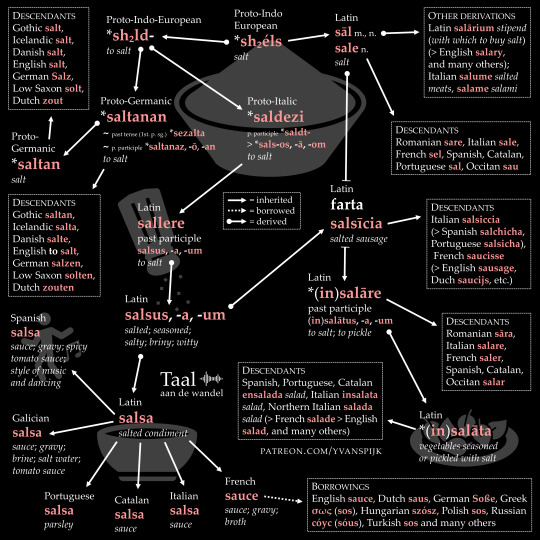
Sauce, salsa & co.
Sauce and salsa have the same origin: they both stem from Latin salsa (salted condiment), via French and Spanish. Their root is found in Latin sāl/sale (salt), from which many words derive, such as sausage, salad, salami, and salary.
English salt, a native Germanic word stemming from Proto-Germanic, is distantly related to the Latin and Romance words. Click the infographic to learn more.
#historical linguistics#linguistics#language#etymology#english#latin#french#dutch#german#spanish#lingblr#occitan#catalan#galician#portuguese#romanian#gothic#icelandic#danish#low saxon#proto-italic#proto-germanic#proto-indo-european
105 notes
·
View notes
Text
You can tag with your answers! I chose 11-13. Rebolg if you vote, I'm curious! :3
#Mine are English Spanish French German Welsh Portuguese Vietnamese Gaelic Dutch Arabic Polish and Korean.#polls#poll#linguistics#language
412 notes
·
View notes
Text
One advantage of having native English speaker friends is that they think being bilingual is super impressive. Mention you’re busy learning your *gasp* third language and they go wild
#then you meet immigrants who speak their native language plus Dutch plus English#and maybe even French or German#and reality comes crashing back down#langblr#frenchblr#language learning
132 notes
·
View notes
Text
Hey I'd like to know, are there more language/nationality subcultures on tumblr and what are they like?
Like... with german tumblr posts it spans across (german) media fandom (2 "we tried to kill your father" gay cops and boarding school teenage drama) to just the German language and german politics and german life style experiences (e.g. Bread discourse) and I really would love to know what tags to browse in order to have like.. a glimpse into other languages.
What is French tumblr like? What is Dutch Tumblr like? Is there Polish Tumblr? Is there Finnish tumblr?
I'm collecting german Mutuals and Blogs by accident and I need to know if other languages have the same or similar culture. How do other languages treat tumblr lingo?
Also is tumblr missing out on possible user influx and ad revenue by not specifically advertising the platform to other countries? Discuss!
(I miss my german viagra advertising. I get almost normal ads like for PoCo Domäne and I hate that)
35 notes
·
View notes
Text
"BOO!" in different languages.
Thanks Duolingo 🦉

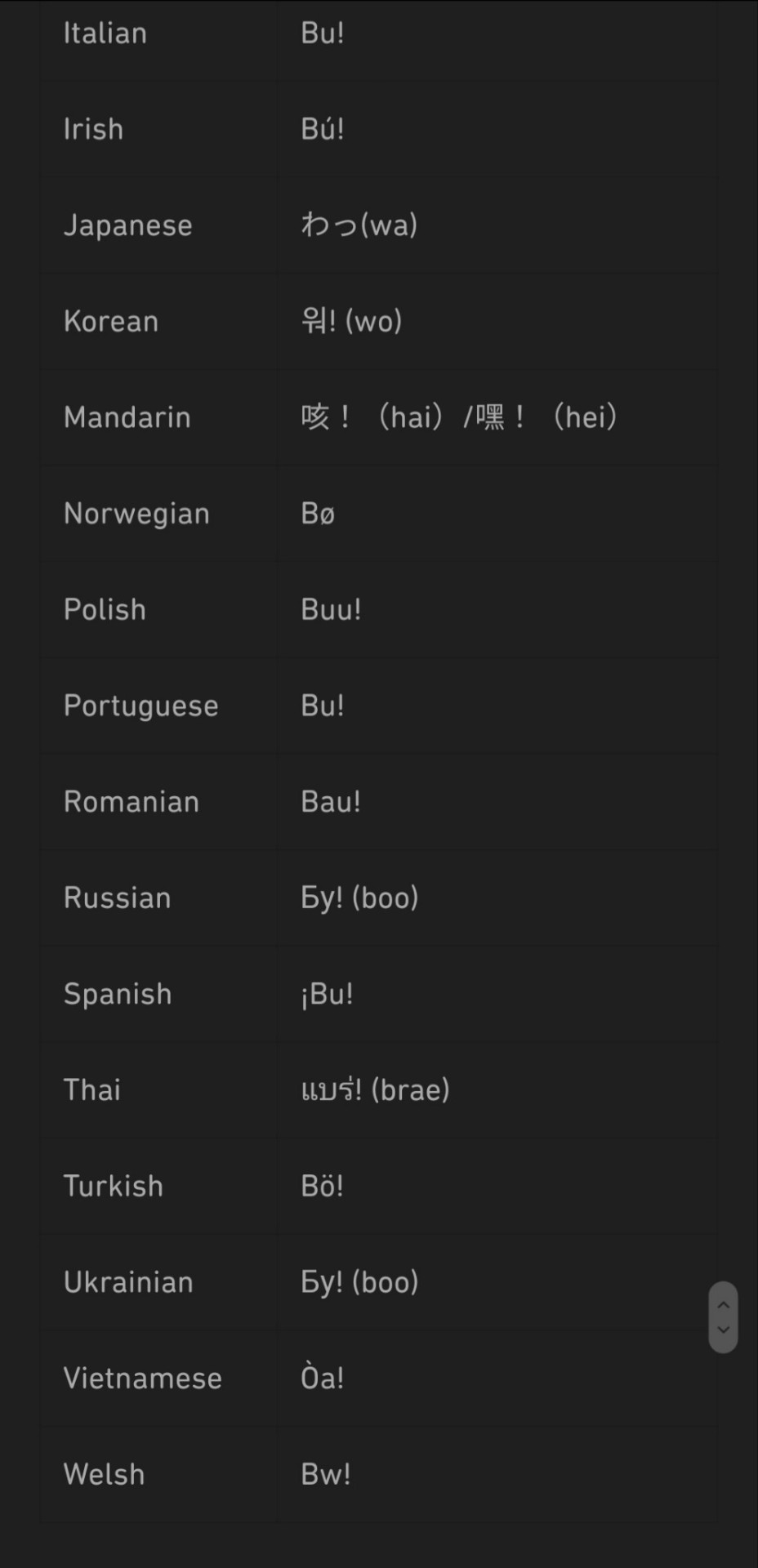
#language#language learning#korean#learning korean#italian#learning italian#greek#japanese#learning japanese#russian#welsh#irish#thai#chinese#mandarin#dutch#french#spanish#german#czech republic#polish
64 notes
·
View notes
Text
3 is a common substitute for ꜣ, which is how Egyptologists romanise the Egyptian Aleph, which sounded like [ʀ] (similar to the French/German R and the Dutch G) so everytime I read stuff like ao3 and bd3 I read them like A'oRRR and BadaRRR.
#ao3#bd3#3#ꜣ#egyptology#linguistics#ipa#french#german#dutch#egyptian#ancient egyptian#lingblr#langblr#languages#aleph
63 notes
·
View notes
Text
Language Roundup
It's time for us to take a look at all the languages that have been nominated for A Different Stroke Exchange this year!
Castellano | Spanish (Spain)
Deutsch | German
Filipino
Français | French
Italiano | Italian
Latin American Spanish
Nederlands | Dutch
Polski | Polish
Português | Portuguese (Brazil)
Português | Portuguese (Portugal)
Suomi | Finnish
Svenska | Swedish
עברית | Hebrew
中文-普通话 國語 | Chinese-Mandarin
한국어 | Korean
Are you interested in writing a fic of at least 500 words in any of these languages, and possibly receiving a fic in one of them in return? Sign-ups for A Different Stroke are still open until 11 April 2024!
Or do you want to try to add another language in the mix? Tag nominations are open until sign-ups close!
A Different Stroke is a multilingual gift exchange open to all languages and fandoms.
If you’re interested in participating, please share this exchange around! The more people join in your target language(s), the more likely we’ll be able to match you!
#a different stroke 2024#spanish#german#french#italian#dutch#polish#portuguese#finnish#swedish#hebrew#chinese#mandarin#korean#language#languages#fic#fic writing#fandom event
30 notes
·
View notes
Text
Untranslatable words (part 3)
Here are part 1 and part 2. I have also made other posts with untranslatable words in Spanish and German.
Arabic: غرفة [ḡurfa] (the amount of water that can be held in one hand), يقبرن [yaqbirna] (literally “may you bury me”, wishing that a loved one outlives you because of how unbearable life would be without them)
Bantu: mbuki-mvuki (to shed one’s clothing spontaneously and dance naked in celebration)
Dutch: gezellig (cozy, nice, pleasant, sociable), struisvogelpolitiek (literally “ostrich politics”, an evasive style of politics that fails to address problems by either ignoring them or by creating a false sense of security through ineffective measures)
Finnish: poronkusema (the distance a reindeer can comfortably travel before taking a break, around 7.5 kilometers/4.7 miles)
French: feuillemorte (of the color of a faded, dying leaf), l’appel du vide (literally “the call of the void”, the inexplicable draw of the dangerous and unknown future), noceur (someone who goes to sleep late or not at all or one who stays out late to party)
German: Drachenfutter (literally “dragon fodder”, the gift a husband gives a wife when he is trying to make up for bad behaviour), Kabelsalat (literally “cable salat”, cable clutter)
Greek: μεράκι (intense passion)
Hungarian: szimpatikus (nice, likeable)
Japanese: ぼけっと [boketto] (gazing vacantly into the distance without thinking about anything), 風物詩 [fūbutsushi] (the things that evoke memories of a particular season)
Hawaiian: ʻakihi (listening to directions and then walking off and promptly forgetting them)
Hindi: जुगाड़ (jugāṛ) (a process or technique that lessens disorder in one’s life, making it easier to manage or more convenient)
Icelandic: tíma (not being ready to spend time or money on a specific thing despite being able to afford it)
Indonesian: jayus (a joke so terrible and unfunny it can’t help but make you laugh)
Inuktitut: ᐃᒃᑦᓱᐊᕐᐳᒃ [iktsuarpok] (the act of repeatedly going outside to check if someone is coming)
Italian: commuòvere (to move in a heartwarming way)
Malay: pisan zapra (the time needed to eat a banana)
Norwegian: forelsket (the indescribable feeling of euphoria experienced as one begins to fall in love)
Portuguese: nefelibata (literally “cloud-walker”, one who lives in the clouds of their own imagination or dreams or does not obey the conventions of society), saudade (a vague, constant desire for something that does not and probably cannot exist, a nostalgic longing for someone or something loved and then lost)
Russian: разлюбить (razliubit) (to fall out of love)
Sanskrit: कल्प [kalpa] (the passing of time on a grand cosmological scale)
Scottish Gaelic: sgrìob (the peculiar itchiness that settles on the upper lip before taking a sip of whiskey)
Spanish: cotisuelto (someone who insists on wearing their shirt tails untucked)
Swedish: mångata (the roadlike reflection of the moon on the water), smultronställe (literally “place of wild strawberries”, a special place treasured for solace and relaxation, free from stress or sadness), tretår (on its own, “tår” means a cup of coffee and “patår” is the refill of said coffee, so a “tretår” is therefore a second refill)
Tagalog: kilig (to experience shivers and suffer pangs from strong emotions, usually romantically)
Ursu: گویا [goyā] (a transporting suspension of disbelief, an “as-if” that feels like reality), ناز [nāz] (the pride and assurance that comes from knowing one is loved unconditionally)
Wagiman: murr-ma (the act of searching for something in the water with only one’s feet)
Welsh: glas wen (literally “blue smile”, one that is sarcastic or mocking), hiraeth (homesickness, nostalgia, a longing for somewhere one cannot or will not return to)
Yiddish: לופֿטמענטש [luftmentsh] (literally “air person”, someone who is a bit of a dreamer)
#langblr#arabic#bantu#dutch#finnish#french#german#greek#hungarian#japanese#hawaiian#hindi#icelandic#indonesian#inuktitut#italian#malay#norwegian#portuguese#russian#sanskrit#scottish gaelic#spanish#swedish#tagalog#ursu#wagiman#welsh#yiddish
139 notes
·
View notes
Note
how many languages do you speak? :o
That's a very cruel question to ask a multilingual person, I have never spoken a language in my life
#okay to reblog#for my fellow multilinguals <3#I'm from the Netherlands and Dutch is my mother tongue#I'm close to fluent in English#my French is an embarrassment. meaning I can understand enough to get by and to correct google translate but can hardly speak it#my German is appalling. meaning I can read it okay because it is similar to Dutch but cannot understand it when spoken nor speak it#and I /wish/ I spoke papiamentu but I never learned more than a few words#beneath-thestyx#for the record I don't mind the question at all ^^ (but I /am/ deeply embarrassed about my french)
30 notes
·
View notes
Text
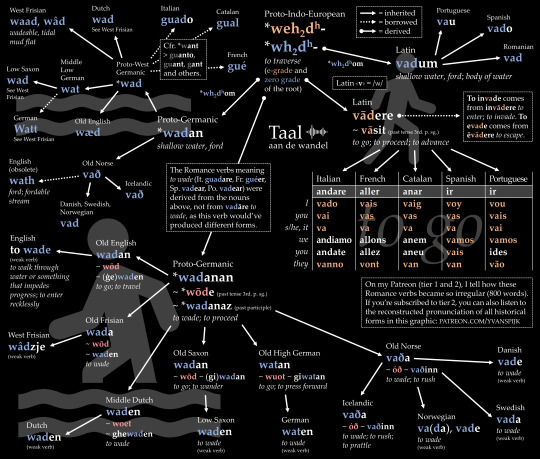
To wade & vadere
The English verb to wade is closely related to Romance verbs forms such as Italian vado (I go), French va (goes) and Spanish vamos (we go). These come from the Latin verb vādere (to go). Most forms of this verb don't survive in the Romance languages, but some of its present tense forms were lent to the mixed bags of the Romance verbs for 'to go'. Click the infographic to learn more about the origins of to wade and its Romance cognates.
On my Patreon you can read why the Romance verbs for 'to go' became so irregular and why the Germanic verbs became regular weak verbs instead (800 words). Patrons who are subscribed to tier 2 can also download an audio file of me reading the historical words in their reconstructed pronunciations.
#historical linguistics#linguistics#language#etymology#english#latin#french#dutch#german#spanish#romanian#catalan#proto-germanic#proto-west germanic#old norse#old high german#old saxon#low saxon#middle dutch#frisian#old frisian#old english#danish#icelandic#swedish#norwegian#portuguese#italian
74 notes
·
View notes
Text
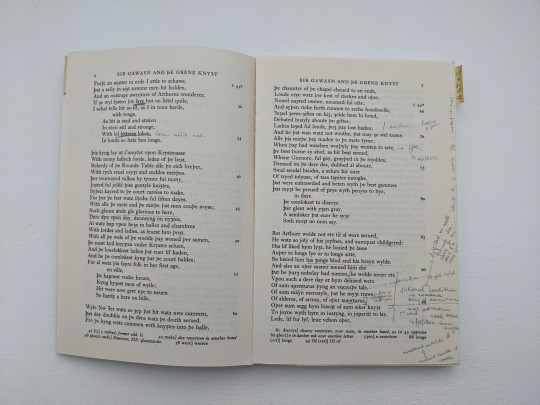
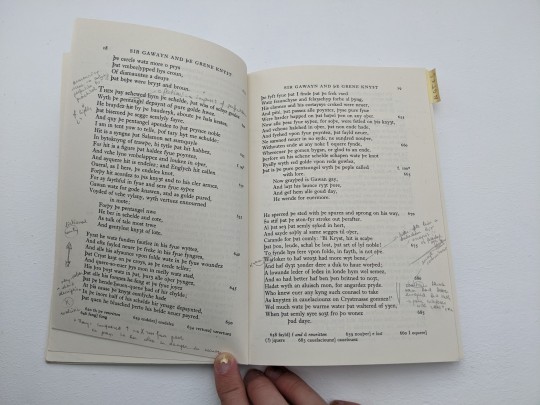
My mother studied what was at the time known as Germanic languages and has since been rebranded to language & literature studies which basically means she has a library about three times the size of mine (especially since she, unlike me, is unable to get rid of books) and of course I deeply enjoy perusing said library and found her school copy of Gawain & the green knight full of her notes. Very cool shit.
#am probably gonna do a media studies masters program which is derived from lang&lit but like#sometimes i do wish id gone into lang & lit instead of art... theres just a bit too much focus on lang unfortch#my mom studied english dutch & german though so some books i unfortunately cannot read#her first language is also french so i cant read those either unless i try very hard but fortunately i dont usually care for the french ones#ANYWAY. thought this would interest the hashtag studyblrs amongst you
58 notes
·
View notes
Photo

Genoveva, Ludwig Richter, 1820-84
Watercolor on paper
12 ¼ x 7 ¼ in. (31.1 x 18.4 cm)
The Metropolitan Museum of Art, New York City, NY, USA
#art#painting#ludwig richter#folklore#19th century#watercolor#1820s#the met#medieval folklore#dutch folklore#belgian folklore#french folklore#german
65 notes
·
View notes
Text


Edgar Degas, Study of Hands, 1860
Germaine Krull, The Hands of the Actress Jenny Burnay, c. 1930
#edgar degas#french artist#french art#french painter#french painting#german photographers#German photography#dutch artist#dutch photographer#art on tumblr#hands#beautiful hands#art photography#aesthetic#beauty#modern art#art history#aesthetictumblr#tumblraesthetic#tumblrpic#tumblrpictures#tumblr art#tumblrstyle#artists on tumblr
20 notes
·
View notes